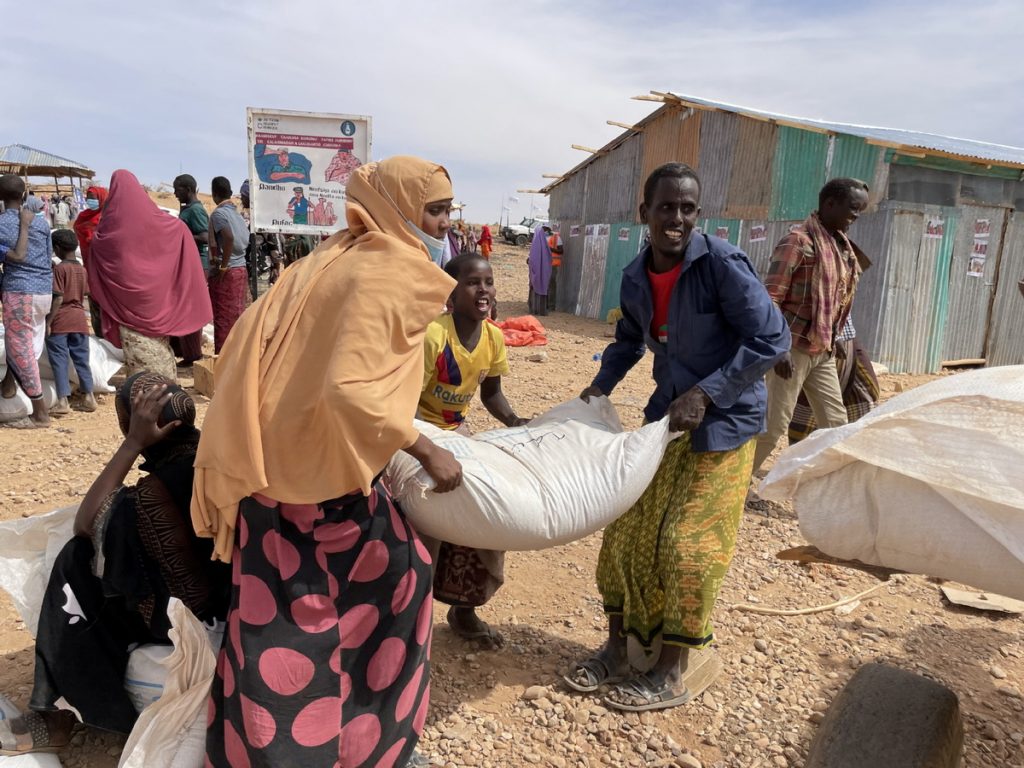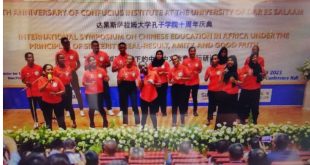published: March 11,2022
By Adhere Cavince

People carry bags of relief grains at a camp for the Internally Displaced People in Adadle district in the Somali region, Ethiopia, Jan 22, 2022. [Photo/Agencies]
China’s proposed Initiative of Peaceful Development in the Horn of Africa could significantly reduce the intensity of conflict and provide respite for millions of people whose fate hangs in the balance against the backdrop of war and underdevelopment.
Despite the Horn of Africa’s natural resource endowments, strategic location and impressive cultural diversity, it remains one of the most conflict-prone regions on the continent. Power struggles and political contests have thrown countries in the region into perpetual turmoil, leading to an irreversible breakdown in societal and governance structures.
The region has also witnessed other forms of conflict, such as terrorism, piracy and proliferation of small and light weapons. As if these are not enough, the Horn has also been a theater of cross-border skirmishes with regional ramifications. Due to the breakdown in statehood in some Horn of Africa countries, security is increasingly becoming perilous.
China’s call for a modern-day “concert of the Horn” can ease the interstate conflicts and strengthen respective governments’ capacity to restore the organs of state, protect lives and reignite economic activity and development. Drawing from its own experience of a conflict-ridden past, China has risen to weave together a cohesive society that is capable of protecting itself from external aggression while providing sustainable means of livelihoods to citizens.
Appointment of a Chinese special envoy to help realize the vision is an important step. It is in line with Beijing’s foreign policy of nonbelligerence, a key asset in China’s international outreach, in which peace and development are placed center stage in international relations. The suggestion is only the latest expression of China’s solidarity with countries in the region.
Under the purview of the Belt and Road Initiative, Beijing has extended development assistance to buoy peace and stability in the region through infrastructure finance and construction. A network of railways, roads, ports and digital connectivity projects aimed at rebooting economic activities in the region have been actualized with the help of China. By committing its resources to long-term foreign direct investment in the Horn countries, China demonstrates its confidence in the potential of the region.
For nearly a decade and a half, China has been conducting escort and rescue missions in the Gulf of Aden and the Somali Basin to ward off pirates who were turning the region into a no-go zone. The missions have succeeded in eliminating the threat of piracy to the benefit of the regional countries, but also the whole world.
As the largest contributor of United Nations peacekeeping forces and the second-largest contributor to the UN peacekeeping budget, China has made tangible contributions in the search for lasting peace and security in Africa’s conflict hot spots, including seven mediation efforts. During the Eighth Ministerial Conference of the Forum on China-Africa Cooperation in Senegal in November, China and Africa amplified their cooperative endeavors for peace and security, including through tackling the proliferation of small arms that has fueled many conflicts on the continent.
China’s partnership with Africa, including on the peace and security front, is welcomed by the majority of Africans. In Afrobarometer’s eighth round of surveys, which covered 2019 to 2021 and involved 34 African countries, 63 percent of respondents had a positive view of China’s assistance and influence on the continent. The countries in the region should therefore leverage such goodwill from the citizens and boldly confront prevailing challenges through multilateralism.
However, sustainable peace and security on the continent are not the exclusive preserve of external actors. Africa must shoulder the leadership responsibility, including creative use of external support, to generate enabling conditions toward breaking the double challenge of conflict and underdevelopment in the region.
The writer is a Kenya-based scholar of international relations with a focus on China-Africa cooperation.
China Daily Global
 Africa -China Review Africa -China Cooperation and Transformation
Africa -China Review Africa -China Cooperation and Transformation
